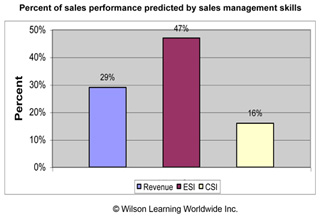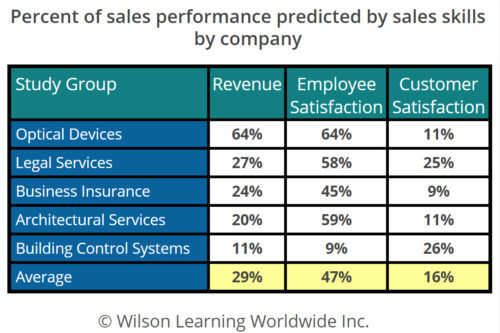Proving the Impact of Sales Management Skills on Performance
Over the past several years, Wilson Learning has had the opportunity to work closely with a number of organizations to uncover the sources of competitive advantage residing in their salespeople and sales managers. We have also had the opportunity to collect sales performance data for many of these companies to analyze the impact of sales management skills. This paper reports on five of those organizations to independently show that effective sales management skills are improving these organizations’ financial performance and customer success.
Working with organizations to identify a core set of sales management skills for creating competitive advantage is one thing, but demonstrating the relationship between these skills and business performance is another. Verifying this relationship is essential if these skills are to become part of an organization’s sales strategy. Therefore, we worked in partnership with five organizations who were willing to:
- Provide us with access to all of their sales force, or a complete division’s sales force, for this study.
- Share performance data for each of the sales groups involved. For this study, we wanted a performance measure that could be applied relatively universally, so we utilized percent of annual quota achieved.
- Administer surveys both within their organization and with their customers to measure customer satisfaction and sales management skills.
We previously reported on our work with these five organizations in our study, Sales as a Source of Competitive Advantage. This report looks specifically at the effects of sales manager skills, while the previous report examined the effectiveness of salespeople. Because we measured both salesperson and sales manager skills in the same study, we were able to isolate the effects of each. We have reported on them separately to make each paper more concise and specific.
These clients view our work with them as one of their own sources of strategic advantage; needless to say, we cannot identify who they are or where they operate. However, we can indicate that they all compete in one of three vertical markets: life sciences, professional services, or financial services.
Assessing Sales Management Skills
The skill requirements of first-line sales managers will vary according to an organization’s market and sales process. In our research, we have found that effective sales managers don’t fulfill one role, but play four critical roles within the organization:
- Sales Tactician/Business Operations Management: In the role of tactician, sales managers use their business management skills to operate their sales group like a business, managing the sales group’s P/L, creating forecasts, and setting priorities.
- Sales Strategist: In the role of strategist, sales managers set a vision for the sales group, define a solution strategy for their market, and align strategic resources in the organization to support sales strategy.
- Contributor: In the role of contributor, sales managers use their business and product knowledge and experience to make needed decisions, and use their creativity and innovation capabilities to align the sales group on common objectives.
- Facilitator: In the role of facilitator, sales managers use communication, negotiation, and team leadership skills to manage a group of salespeople.
For these studies, we developed a 35-item sales leadership survey that determined the sales managers’ current performance on behaviors associated with these four skill clusters. This survey was administered as a 360-degree feedback system. In other words, input into each manager’s performance was gathered from the manager’s salespeople, executive manager, peers, and the manager him- or herself. This measurement system is called the Sales Manager Navigator because it combines measurement with development planning, coaching, and a results interpretation workshop to help sales managers “navigate” their way to improved performance.
Measuring Sales Performance
For most organizations, sales performance is multi-dimensional. That is, they view several outcomes as important to overall sales performance. To show the full effect of the sales manager’s skills, we measured three critical components of sales performance:
- Sales Revenue: Given the wide diversity of the organizations, we examined sales revenue through the percent of quota each salesperson achieved. This allowed us to compare equitably across the five organizations, where there was a wide range of product costs and average sales price.
- Customer Satisfaction: Many organizations consider customer satisfaction to be at least as important as revenue. In previous research, our measures of customer satisfaction have predicted things like customer retention, repurchasing, and sales per year. Thus, while independent of the revenue measure, customer satisfaction was measured as an indicator of long-term sales performance.
- Salesperson Satisfaction: One of the key jobs of sales managers is to motivate and retain their high-performance salespeople. Therefore, we included in this study a measure of employee satisfaction that in previous research has been linked to outcomes such as salesperson retention, job tenure, performance, and other measures that indicate important business outcomes.
The studies were all conducted in the same way:
- We created a survey that measured core sales management skills. The survey consisted of 35 questions that had previously been assessed as reliable and valid measures of these skills. (More detail on the validation of all the measures is available.)
- The surveys were distributed as a 360-degree feedback system. That is, the surveys were completed by salespeople, sales executives, and sales managers and their peers.
- The organization provided us with each salesperson’s quota achievement from the previous 12 months.
- We distributed a customer satisfaction survey to the organizations’ customers to create a Customer Satisfaction Index (CSI). This CSI had been previously assessed as a reliable and valid measure of customer satisfaction.
- Salespeople were also asked to complete an employee satisfaction survey to generate an Employee Satisfaction Index (ESI). This ESI had also been previously assessed as a reliable and valid measure of employee satisfaction.
To prove the link between sales management skills and the three measures of performance, we used a technique known as multiple regression analysis. In brief, the analysis results in a percentage (referred to as R2) between 1.00 and 0.00. This number indicates what percent of sales performance can be predicted by knowing the skills of sales managers. The higher the R2, the more impact sales managers have on sales performance.
Findings
Results of this study provide convincing evidence that a sales manager’s skills are a strong predictor of all three sales performance measures. That is, managers with stronger sales leadership skills had higher revenue, greater customer satisfaction, and salespeople who were personally more satisfied.
 We cannot show you actual performance measures, both because this was confidential information and there was wide variety across the five organizations in the revenue data, but we can show the general pattern of results from these five studies. The graph shows the percent difference in Revenue, ESI, and CSI for sales managers with high skill ratings when compared to sales managers with low skill ratings. The high-skill sales managers had 29% higher revenue performance, 47% higher employee satisfaction (ESI), and 16% higher customer satisfaction (CSI) than did sales managers with low skill ratings.
We cannot show you actual performance measures, both because this was confidential information and there was wide variety across the five organizations in the revenue data, but we can show the general pattern of results from these five studies. The graph shows the percent difference in Revenue, ESI, and CSI for sales managers with high skill ratings when compared to sales managers with low skill ratings. The high-skill sales managers had 29% higher revenue performance, 47% higher employee satisfaction (ESI), and 16% higher customer satisfaction (CSI) than did sales managers with low skill ratings.
It is important to note that this relationship to revenue and customer satisfaction is independent of salesperson skills. Said another way, we statistically factored out the effects that could be attributed to differences in the skills of the salespeople. Thus, what this graph tells us is that, in addition to the effect that salesperson skills have on revenue performance (reported in a separate study), the manager’s skills can add another 29% on top of that. It is no surprise that the effect was strongest on salesperson satisfaction (ESI), because this is the characteristic most directly affected by a manager’s abilities to lead. It is also interesting that the manager’s skills have a positive influence on customer satisfaction, even though managers have little direct contact with customers.
Differences Across Organizations
 There were also interesting differences among the organizations in how much the sales manager skills predicted the sales performance measures. As the next table shows, the proportion of revenue accounted for by the sales manager skills ranged from a high of 64% to a low of 11%. Employee satisfaction ranged from 64% to 9%, and customer satisfaction from a high of 26% to a low of 9%.
There were also interesting differences among the organizations in how much the sales manager skills predicted the sales performance measures. As the next table shows, the proportion of revenue accounted for by the sales manager skills ranged from a high of 64% to a low of 11%. Employee satisfaction ranged from 64% to 9%, and customer satisfaction from a high of 26% to a low of 9%.
Thus, the sales process, industry, and market greatly affect how much impact sales managers’ skills have on sales performance. The impact can be very great in an industry like the optical devices company, but tends to be more moderate in some of the other industries. These results show the importance of analyzing the roles and responsibilities of sales managers before providing sales management training.
What Is the Cost of Poor Sales Management?
These studies demonstrate the impact that effective sales leadership skills can have on revenue performance, customer satisfaction, and employee satisfaction. The value of effective sales management is in sharp contrast to the costs of ineffective sales management. A senior sales manager in one of the companies we work with made this comment: “In my experience, the cost of a single bad District Manager promotion is in the millions!” What are the costs of making a poor manager promotion decision? Here are a few of the costs you incur when you take an effective salesperson out of the field and make him or her an ineffective sales manager:
- Loss from transitioning the customer base: Bringing in a salesperson to handle the manager’s former accounts always results in some stalling or reduction in revenue from that account.
- Salesperson attrition: It does not take long for salespeople to see when a sales manager will not help them in building business, and the best salespeople will move quickly to either another sales division or another company.
- Reduced salesperson effectiveness: When managers take a heroic approach, or provide limited guidance, the remaining salespeople are de-motivated and their performance drops.
- Loss of good will in the marketplace: As salespeople leave and customers begin dealing with a string of temporary salespeople, they lose faith in the vendor.
- Harder to hire: Replacing salespeople who leave becomes harder and more expensive as the reputation of that sales manager gets more widely known.
This study shows that effective first-line sales managers have a direct, and independent, impact on revenue. Also, because effective sales leadership leads to more satisfied salespeople and customers, this impact is sustained over the long term. The differences among the organizations studied further points out the necessity of analyzing the role of sales managers prior to implementing training and development. While the desired outcomes of effective sales management are clear, the specific “hats” that sales managers are expected to wear differ greatly from organization to organization. You need to first carefully consider your expectations of your sales managers and the skills and competencies required to meet these expectations.


 We cannot show you actual performance measures, both because this was confidential information and there was wide variety across the five organizations in the revenue data, but we can show the general pattern of results from these five studies. The graph shows the percent difference in Revenue, ESI, and CSI for sales managers with high skill ratings when compared to sales managers with low skill ratings. The high-skill sales managers had 29% higher revenue performance, 47% higher employee satisfaction (ESI), and 16% higher customer satisfaction (CSI) than did sales managers with low skill ratings.
We cannot show you actual performance measures, both because this was confidential information and there was wide variety across the five organizations in the revenue data, but we can show the general pattern of results from these five studies. The graph shows the percent difference in Revenue, ESI, and CSI for sales managers with high skill ratings when compared to sales managers with low skill ratings. The high-skill sales managers had 29% higher revenue performance, 47% higher employee satisfaction (ESI), and 16% higher customer satisfaction (CSI) than did sales managers with low skill ratings. There were also interesting differences among the organizations in how much the sales manager skills predicted the sales performance measures. As the next table shows, the proportion of revenue accounted for by the sales manager skills ranged from a high of 64% to a low of 11%. Employee satisfaction ranged from 64% to 9%, and customer satisfaction from a high of 26% to a low of 9%.
There were also interesting differences among the organizations in how much the sales manager skills predicted the sales performance measures. As the next table shows, the proportion of revenue accounted for by the sales manager skills ranged from a high of 64% to a low of 11%. Employee satisfaction ranged from 64% to 9%, and customer satisfaction from a high of 26% to a low of 9%.